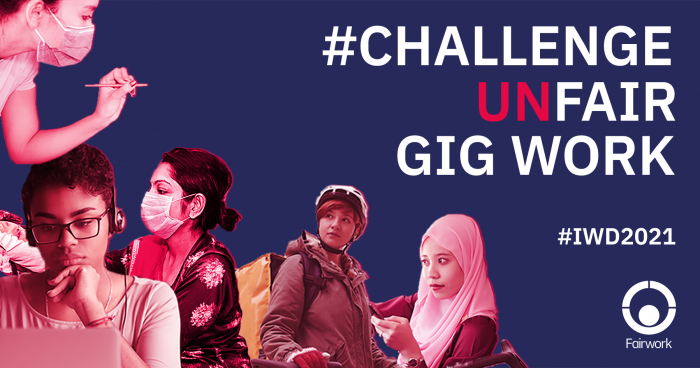On International Women’s Day, Choose to Challenge Unfair Gig Work

On this International Women’s Day, we want to raise awareness about the situation of women working in the gig economy, as part of our mission of promoting fair and equitable pay and conditions for all platform workers.
According to a recent ILO report, four in ten workers on cloudwork platforms, and one in ten workers on geographically-tethered platforms are women. Digital labour platforms can support women’s empowerment as they provide new opportunities for work, especially in contexts where women have difficulties accessing the labour market. The promise of flexibility offered by gig work might appeal to women who also have to bear care responsibilities. Furthermore, new forms of algorithmic management on digital labour platforms could, theoretically, contribute to eliminating bias and discriminintation in the processes of recruiting workers, allocating tasks, and determining pay, as well as improve work safety, which might benefit women workers. A study of female ride-hailing drivers in Egypt conducted by the team of Fairwork Egypt identified these three elements – new opportunities, flexibility and safety – as the primary reasons women choose to engage in this type of work.
However, in practice, we often see long-standing structural gender inequalities being transferred to, and even further exacerbated, in the gig economy. This is most noticeable in the high levels of gender segregation across sectors. E-hailing and delivery work are disproportionately performed by men, while women are overrepresented in care work and domestic work platforms. The effects of this occupational segregation became particularly visible during the pandemic, when care, domestic and beauty service platforms suspended their services due to national lockdown regulations – leaving their majority women workforce out of any income opportunities.
Even within the same sector, evidence suggests women in the gig economy suffer from a gender pay gap. A 2018 study found a gender pay gap of 7 percent among rideshare drivers in the US. Furthermore, recent research has shown that even in cloudwork platforms, in which work is performed anonymously, there can be gender pay discrepancies. Evidence on freelance work is mixed, “at the global level there is no difference in hourly earnings, while at the country level there is a significant gender pay gap in some cases” (ILO, 2021).
Discrimination can also arise from the algorithmic management systems that govern platform work. While platforms present themselves as neutral intermediaries of job allocation, the social contexts they operate in, as well as hidden biases often embedded in their algorithms, entail that discrimination can happen through and because of them. For instance, ratings and user review systems that many platforms use to manage workers’ performance can lead to bias and discrimination of women workers. These depersonalised management systems can also reinforce existing prejudices, as in the case of female ojek drivers in Indonesia who struggle to find customers on ride-hailing platforms. Furthermore, gig workers are often not adequately protected by existing anti-discrimination laws.
At Fairwork, we believe platforms have a responsibility to address patterns of gender inequality and discrimination in their workforce. Our principle of Fair Management codifies some best practices to protect women, as well as other vulnerable groups:
- Platforms should have a policy which ensures they do not discriminate on grounds such as race, social origin, caste, ethnicity, nationality, gender, sex, gender identity and expression, sexual orientation, disability, religion or belief, age or any other status.
- Where persons from a disadvantaged group (such as women) are significantly under-represented among its workers, platforms should seek to identify and remove barriers to access by persons from that group.
- Platforms should take practical measures to promote equality of opportunity for workers from disadvantaged groups, including reasonable accommodation for pregnancy, disability, and religion or belief.
As researchers, it is important that we question the ways in which existing inequalities can be reproduced, and even deepened by digital labour platforms. Through our ratings and growing transnational network of social just-minded scholars, we hope to continue working towards building a better future of work for all women and men.